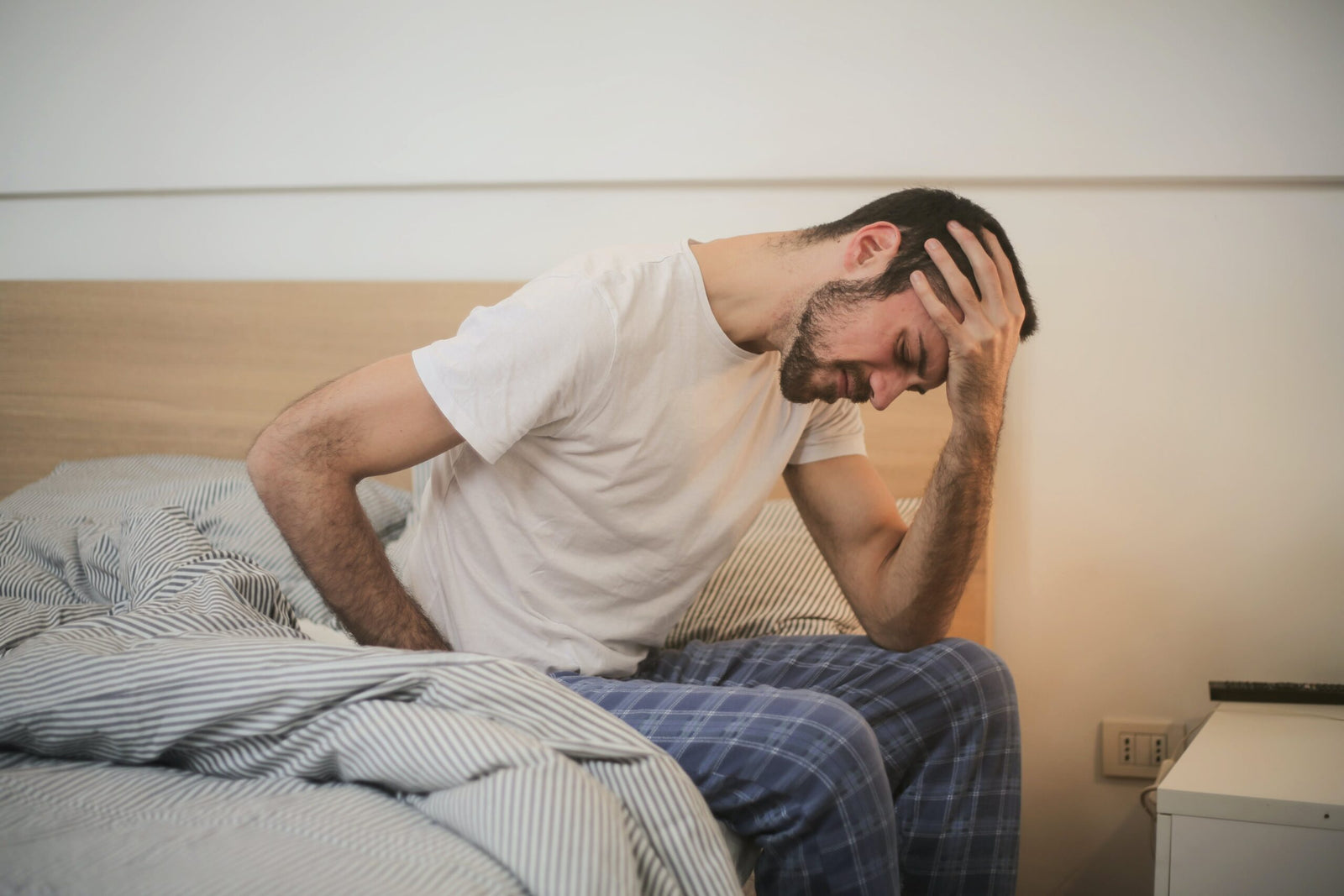
Table of Contents
- Introduction
- What Triggers Morning Headaches?
- Sleep Apnea
- Snoring
- Sleep Deprivation and Insomnia
- Circadian Rhythm Disorders
- Oversleeping
- Migraines
- Bruxism or Teeth Grinding
- Tension
- Hangover
- Certain Medications or Supplements
- Guidance for Avoiding Morning Headaches
- Ways to Relieve Your Morning Headache
Main Points to Remember
- Regular headaches upon waking could indicate issues such as insomnia, sleep apnea, or various other sleep-related conditions.
- Other factors that might lead to headaches in the morning include intense snoring, sleeping too much, and suffering from migraines.
- Adopting specific lifestyle modifications may assist in preventing headaches in the morning.
- If sleep apnea is suspected as the cause of your morning headaches, consider conducting a sleep test at home.
If morning headaches are a regular part of your waking routine, you're not the only one. About one in every 13 individuals experiences headaches upon waking. These types of headaches are more prevalent in women than men and are often seen in adults aged 45 to 64.
Various health or sleep disorders, alongside individual habits, can lead to headaches first thing in the morning. Conditions such as sleep apnea, migraines, and insufficient sleep are typical factors. Additionally, habits like teeth grinding, consuming alcohol, and the use of certain medications might be responsible for your morning headaches. In some cases, a blend of different disorders or habits could be the underlying cause of these headaches. This highlights the importance of understanding sleep studies, in-home sleep studies, and the role they play in diagnosing and managing conditions like sleep apnea, which can be a key contributor to such symptoms.
What Triggers Morning Headaches?
When transitioning from sleep to wakefulness, different parts of your brain start to become more active. This increased activity makes your brain more responsive to bodily movements, touch, and auditory stimuli. During this sensitive period, there's an increased likelihood of experiencing pain.
The hypothalamus, a brain region integral to both sleep and pain regulation, plays a key role here. It controls your circadian rhythms and sleep patterns, and also influences how you perceive pain. Any disruptions in the hypothalamus during sleep can alter your pain tolerance, possibly leading to pain sensation upon waking, even if it wasn't felt during sleep.
Among the various causes of morning head pain, sleep disorders are particularly notable. This emphasizes the significance of understanding and considering sleep studies, including at-home sleep studies, for diagnosing conditions like sleep apnea, a common factor in morning headaches.
Sleep Apnea
Obstructive Sleep Apnea (OSA), characterized by interrupted breathing during sleep, affects a significant portion of the adult population. Morning headaches are a frequent symptom of OSA. Though the direct cause of these headaches in OSA patients isn't fully understood, they are often linked with snoring, a symptom of OSA. Using a CPAP machine to treat sleep apnea can be effective in reducing or eliminating these morning headaches.
Snoring
Not everyone who snores has sleep apnea, but snoring itself can be a cause of morning headaches. Studies show a notable percentage of regular snorers experience these headaches. Factors like migraines, insomnia, and psychological stress can increase the likelihood of morning headaches among snorers.
Sleep Deprivation and Insomnia
Insufficient sleep is a common trigger for morning headaches, making those with insomnia particularly susceptible. Insomnia causes difficulties in falling or staying asleep, leading to inadequate rest and daytime fatigue.
Circadian Rhythm Disorders
Those with circadian rhythm disorders often face more frequent morning headaches than individuals without sleep disorders. These disorders arise when your natural sleep-wake cycle is misaligned with the typical 24-hour day, often resulting in insufficient sleep and subsequent morning headaches.
Oversleeping
Contrary to common belief, oversleeping can also lead to morning headaches. Both the quality and duration of sleep are linked to the severity of headaches experienced upon waking. Excessive sleep can contribute to what's known as an "oversleeping headache."
Migraines
Migraines, intense recurring headaches, frequently occur in the morning. They are especially prevalent among women and individuals with sleep disorders. Migraine sufferers are more likely to have problems with sleep, and continuous sleep deprivation can trigger migraines.
Bruxism or Teeth Grinding
Sleep bruxism, characterized by grinding or clenching teeth during sleep, often leads to morning headaches. It can also cause tooth wear, muscle pain, and gum damage. Factors contributing to sleep bruxism include jaw irregularities, stress, sleep disturbances, alcohol consumption, and caffeine. Diagnosis and treatment by a dentist, including the use of a mouthguard and possibly medication or cognitive behavioral therapy, can help.
Tension
The way you sleep, including your posture and position, can cause tension, potentially disrupting sleep and causing headaches. Adjusting your sleep position or using a supportive pillow might alleviate this tension.
Hangover
Heavy alcohol consumption is highly associated with morning headaches. Alcohol affects sleep quality and can cause dehydration, a common headache trigger. Even moderate alcohol intake can disrupt sleep and lead to headaches.
Certain Medications or Supplements
Some medications and supplements can cause headaches as a side effect. Taking these substances for head pain can lead to a cycle of chronic headaches. Drugs known to contribute to headaches include opioids, triptans, NSAIDs, aspirin, acetaminophen/paracetamol, and anti-anxiety medications. Morning headaches can also result from overnight withdrawal from these drugs.
Guidance for Avoiding Morning Headaches
If you regularly experience morning headaches, it's important to consult your healthcare provider to determine their cause. Maintaining a sleep diary to document your symptoms and sleep patterns can be invaluable. Sharing this information with your doctor will assist in pinpointing the specific cause or causes of your headaches, allowing for the creation of an effective treatment strategy.
Alongside treatments tailored to your specific triggers, enhancing your sleep hygiene can also be beneficial:
Establish a Regular Sleep Routine
Aim to go to bed and wake up at the same times every day.
Establishing a regular sleep routine is a key strategy to mitigate these headaches. It involves maintaining consistent sleep and wake times every day, even on weekends. This consistency helps regulate your body's internal clock, leading to improved sleep quality and potentially reducing the frequency of waking up with headaches. Consistency in your sleep schedule assists in synchronizing your circadian rhythms, which are critical in governing sleep patterns. Disruptions in these rhythms often contribute to poor sleep quality, one of the primary triggers for morning headaches. By going to bed and waking up at the same time daily, you provide your body with the rhythm it needs for a restful sleep, thus lowering the chances of experiencing headaches upon waking.
Moreover, a regular sleep routine aids in the prevention of sleep disorders like insomnia, which is closely linked to morning headaches. Insomnia often results from erratic sleep schedules, leading to difficulty in falling or staying asleep, and ultimately waking up with headaches. A consistent sleep schedule can help prevent the onset of such issues. Additionally, integrating a regular sleep routine into your lifestyle is beneficial for overall health. It not only addresses the issue of morning headaches but also improves general well-being. Adequate and consistent sleep is essential for cognitive function, emotional balance, and physical health. In summary, establishing a regular sleep routine is an effective measure against morning headaches. It not only enhances sleep quality and regulates circadian rhythms but also plays a vital role in preventing sleep-related disorders and promoting overall health. By adhering to a consistent sleep schedule, you can significantly reduce the likelihood of waking up with headaches, leading to more energized and productive mornings.

Exercise Consistently
Engage in physical activity several hours before bedtime, as exercising too close to when you sleep might delay falling asleep.
Regular exercise is a vital component in managing morning headaches, as it plays a significant role in promoting better sleep quality and overall well-being. Engaging in consistent physical activity, ideally several hours before bedtime, can greatly reduce the likelihood of waking up with headaches. Exercise stimulates various brain chemicals that may leave you feeling happier and more relaxed, which in turn can lead to better sleep.
However, timing is crucial when it comes to exercise's impact on sleep. Working out too close to bedtime can have the opposite effect, potentially causing delays in falling asleep. This is due to the energizing effects of exercise, which increase heart rate and stimulate the release of endorphins, keeping the body alert. To avoid this, it is recommended to finish exercising at least a few hours before you plan to go to sleep. This allows your body temperature and heart rate to return to levels conducive to rest.
Consistent physical activity has been shown to improve sleep patterns and is especially beneficial for those with sleep-related disorders, which are often a source of morning headaches. Regular exercise helps regulate your sleep-wake cycle and can increase the amount of time spent in deep sleep, the most restorative sleep phase.
In addition to improving sleep, exercise also reduces stress and anxiety, which are common triggers for both headaches and sleep disturbances. By lowering stress levels, you can improve both the quality of your sleep and the likelihood of waking up refreshed and headache-free.
Incorporating a routine of regular, appropriately timed exercise can be a powerful tool in reducing the frequency of morning headaches. It not only enhances sleep quality but also addresses several underlying factors that can contribute to headaches upon waking. As such, exercise emerges as an essential component in a holistic approach to preventing morning headaches and improving overall health.
Moderate Caffeine and Alcohol Consumption
Consuming caffeine in the afternoon or alcohol shortly before bed can disrupt your sleep.
Moderating the consumption of caffeine and alcohol is an essential strategy for those suffering from morning headaches, as both substances can significantly impact sleep quality. Caffeine, a stimulant found in coffee, tea, soda, and chocolate, can disrupt your sleep cycle when consumed in the afternoon or evening. It works by blocking the action of adenosine, a brain chemical involved in sleep, and can delay the timing of your body clock, reducing your total sleep time. This disruption can lead to waking up with headaches due to inadequate or disturbed sleep.
Similarly, alcohol, often mistakenly considered a sleep aid due to its sedative effects, can severely impair sleep quality. While it may help induce sleep initially, alcohol consumption before bed can lead to non-restorative sleep, frequent awakenings, and a reduction in REM sleep - the most restorative phase of the sleep cycle. This disruption in sleep architecture can result in morning headaches and a feeling of unrefreshed sleep.
The metabolization of alcohol during the night also plays a role in disturbing sleep. As the body breaks down alcohol, it can cause alterations in sleep patterns in the second half of the night, leading to increased sleep fragmentation and morning headaches.
To prevent these sleep disturbances and reduce the risk of morning headaches, it is advisable to limit caffeine intake to the early part of the day and to avoid alcohol consumption close to bedtime. By doing so, you can improve both the quality and quantity of your sleep, thereby reducing the likelihood of waking up with headaches. This approach not only addresses the immediate concern of morning headaches but also contributes to better overall health and well-being.
Optimize Your Sleeping Environment
Create a space that is dark, cool, and quiet. Reserve your bed primarily for sleep and intimacy.
Optimizing your sleeping environment is a key factor in preventing morning headaches, as it directly influences the quality of your sleep. Creating a sleep-friendly space involves ensuring that your bedroom is dark, cool, and quiet, which are all conditions that support deeper and more restful sleep.
A dark environment is crucial because light can interfere with the production of melatonin, a hormone that regulates sleep-wake cycles. Even small amounts of light from electronic devices or streetlights can disrupt your body's natural sleep rhythm. Using blackout curtains or an eye mask can help maintain darkness, thereby enhancing your sleep quality and reducing the likelihood of waking up with headaches.
Maintaining a cool room temperature is also important for good sleep. A cooler environment mimics the body’s natural temperature drop during sleep, which is necessary for deep, uninterrupted sleep. An overly warm room can lead to restlessness and frequent awakenings, both of which can contribute to morning headaches. Setting your thermostat to a comfortable, cooler temperature or using a fan can be effective ways to achieve this.
A quiet environment is essential to prevent disturbances during the night. Noise can interrupt your sleep cycle, leading to lighter, fragmented sleep and increasing the chances of morning headaches. Using earplugs or SoundOff Sleep Earbuds can help block out disruptive sounds and promote a peaceful sleep environment.
Additionally, reserving your bed primarily for sleep and intimacy helps strengthen the association between your bed and sleep. This can be particularly beneficial for individuals with insomnia or those who struggle to fall asleep. By limiting activities like watching TV, working, or eating in bed, you can reinforce this association, making it easier to fall asleep and reducing the risk of morning headaches.
In summary, optimizing your sleeping environment by ensuring it is dark, cool, and quiet, and using your bed mainly for sleep and intimacy, can significantly improve sleep quality. This, in turn, can reduce the frequency of morning headaches, contributing to better overall health and well-being.
Develop a Calming Evening Ritual
Engaging in relaxing activities like a warm bath, reading, or meditation can signal to your body that it's time to rest.
Developing a calming evening ritual is a highly effective method for combating morning headaches, as it prepares your body and mind for restful sleep. Engaging in relaxing activities before bed helps signal to your body that it's time to wind down, facilitating a smoother transition into sleep. This relaxation routine can greatly improve sleep quality, thereby reducing the likelihood of waking up with headaches.
One beneficial activity to include in your evening ritual is taking a warm bath. The warmth of the bath can help relax your muscles and ease tension, which is particularly helpful if stress or physical discomfort contributes to your headaches. Additionally, the drop in body temperature after a warm bath can mimic the natural temperature decrease that your body experiences when falling asleep, further promoting drowsiness.
Reading is another excellent addition to your nightly routine. Engaging in light, leisurely reading can provide a mental escape and reduce stress, which are both crucial for achieving restful sleep. However, it's important to avoid stimulating or distressing content, as this can have the opposite effect.
Meditation is also a powerful tool for relaxation. Practices like mindfulness meditation or guided imagery can help clear your mind, reduce anxiety, and promote feelings of calm. Even a few minutes of meditation can have a significant impact on your ability to relax and enjoy a deep sleep.
By incorporating these relaxing activities into your evening routine, you can create an ideal environment for sleep. This helps regulate your sleep patterns and reduces the risk of morning headaches, leading to a more refreshed and rejuvenated start to your day.
By practicing good sleep hygiene and addressing the underlying disorder causing your headaches, you may significantly reduce or completely eliminate morning headaches. Discuss with your healthcare provider to identify the most suitable treatment plan for your needs.

How to Relieve Your Morning Headache
Thermal, or heat therapy, is an emerging solution that can offer natural relief for morning headaches from the comfort of your home. Many individuals report experiencing a reduction in their pain when using heat. Immersing your feet in hot water could be particularly effective, especially when combined with other natural home treatments or medications for morning headaches.
How Does It Work?
Immersing your feet in hot water might help in reducing both the frequency and severity of your morning headaches. This practice could also positively affect the health of your autonomic nervous system, particularly impacting the trigeminal and vagus nerves. As a result, you might experience fewer days with intense pain each month, potentially reducing the need for additional medication.
Using hot water for foot soaks as a method to alleviate morning headaches can alter your body's blood flow. It has a beneficial effect on your nervous system, especially focusing on the vagus nerve. The stimulation of the vagus nerve can inhibit the trigeminal nerve's action of dilating blood vessels. This leads to a balance in neurotransmitters and prevents cortical spreading depression, contributing to headache relief. The combined effect of these physiological changes can significantly alleviate your morning headache while you relax with your feet in hot water.
Herbal Remedies for Morning Headaches
Herbal remedies can be a natural option for treating morning headaches from the comfort of your home:
- Chamomile: Known for its potential pain-relieving properties, chamomile may be effective in managing symptoms associated with morning headaches, such as nausea, pain, and sensitivity to light.
- Peppermint: This herb could be a safe and effective option for the treatment of morning headaches. Peppermint essential oil might offer immediate relief from morning headaches, potentially showing effectiveness in as little as 5 minutes. It could also help reduce the frequency of your morning headaches and alleviate their intensity.
However, it's important to consult with your healthcare provider before introducing any new herbs or medications into your routine.

































